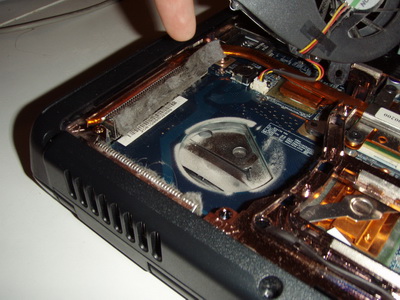Opera 10 beta hits portages with its customizable speed dial feature. As for me, that could be better.
Why not to customize the grid of speed dial in such a way that a user can choose independently x-y size, with discretization 1 column-row? With my usual portrait display mode all the cells are concentrated in the center of a screen.
Something has to be done with shortcuts Ctrl+digit. Nine shortcuts are not enough for 25 cells anymore. I think that could be something like Ctrl+0, [switched to speed dial mode], digit, digit [i.e. up to 99 choices].
A hundred of those tabs should be ok, as for me.
I filed this bugreport them (reference email DSK-258394 at bugs.opera.com).
It really bothered me. So, I googled. All links give the same solution: one, two, three.
Some months ago my notebook began to overheat. When the CPU is loaded enough, its temperature grows over 95 degrees Celsius, and a guard mechanism throttles down its frequency to 40 % and waits until it cools down. Within a few minutes the system is badly responsive.
I bought a cooling platform for it, but with time it couldn't restrain the heat. A problem became worse and worse, but the warranty for the laptop was void already. So, I took a screwdriver and solved it:

A dense layer of dust covered the radiator and prevented air flow. Now under 100 % load my CPU is cool enough. I mean, for a Turion --- 80 degrees Celsius for the general sensor, 85 for the first core, and 91-93 for the second one (sitting on a table, without a cooling platform). Strange gradient, but anyway, a system doesn't freeze now.
Monitors become wider and wider due to the entertainment industry, but changing proportion in fact decreases a number of pixels from top to bottom of a screen. If you look at some program code now, you see just some lines clustered along the left boundary of a screen and lots of free space.
A standard coder should not appreciate that, unless he is me and likes spaghetti code style (by this I mean lines 200 symbols wide). However, this is applicable only for code in the functional paradigm. In the imperative style I don't do this. And anyway, there are usually code style conventions limiting that for a project.
I've seen some people using two source code windows filled with different source files. This could be nice, especially for diffs. However, I think, a coder should appreciate increasing number of lines vertically. The ultimate solution is to buy a monitor with the pivot function --- switching between landscape and portrait on-the-fly. Of course, this requires support from drivers/OS. And nvidia, radeon drivers provide that.
Switching under Windows is easy, for Linux it required some investigations. You enable it first in /etc/X11/xorg.conf (Section "Screen"):
Option "RandRRotation" "true"
This is for nvidia card, but I guess, radeon drivers should provide the same. Then under KDE you run a command:
xrandr -o left
to switch to the portrait mode or "-o normal" for switching back.
I also tried krandrtray application, but it didn't work for me. By the way, don't logout from KDE during the portrait mode. I filed a bug for the KDE team.
I had three HDD drives, and I made a mistake installing Linux on the third one. I think, "the third" means that it hangs on SATA-channel 3. But GRUB sees a (first on that drive) boot partition at it as (hd0,0), if I choose the drive as the first to boot from in BIOS.
So, I removed one drive from a system, and my /dev/sdc became /dev/sdb. Of course, /etc/fstab still contains /dev/sdc* references and I get a kernel panic at boot. Actually, my GRUB also contains reference to the root partition at /dev/sdc, but this can be changed in interactive GRUB mode.
The issue can be solved changing /etc/fstab with a sytem rescue cd/usb, but I prefer to have no limitations on changing drives. I took a clean HDD, put it on SATA-channel 1 (it appears as /dev/sda), partitioned properly and copied everything from an old drive. Then edited /etc/fstab, grub-install --no-floppy /dev/sda with a proper grub.conf and it just works. Now I have two identical Linuxes on different drives, and I will probably keep the old one for a while (just in case).
By the way, at first I made a mistake copying with bare cp -r command. This made user accounts (except root) not usable, as access rights were changed. Copy with cp -a in this situation.
Meditating whether to merge docs for some package, I asked myself "why not to grab all those tons of mans available and store them locally?" Indeed, there's plenty of space on modern HDDs. So, I've set globally the "doc" flag and run rebuild of the whole system.
Strangely enough, adding this flag seems to require recompilation of binaries, but that's not the worse thing. Rebuild proccess just hangs on kdelibs package (exactly when installing help docs). Pressing Ctrl+C and trying again several times gives the same. I've hit upon such a phrase in a handbook:
The best way of enabling the doc USE flag is doing it on a per-package basis via /etc/portage/package.use, so that you get documentation only for packages that you are interested in. Enabling this flag globally is known to cause problems with circular dependencies.
What a poor excuse this sounds to me! Anyway, disabled that flag and recompiled everything back.
The most easy-to-use Scheme compiler/interpreter is PLT, simple IDE is included. Emerging the latest ebuild gives errors under -O3 optimization flag, I confirmed it at the bugtracker. The solution is to switch temporarily to -O2.
